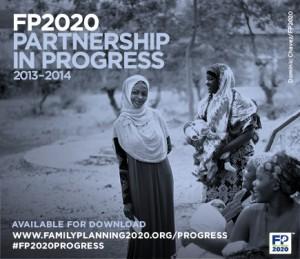
Two years after the London Summit on Family Planning, funding for family planning programmes and the number of women and girls using modern contraception has increased significantly.
On 3 November, 2014, Family Planning 2020 (FP2020)released its second progress report detailing achievements since the landmark 2012 London Summit on Family Planning. The report, Partnership in Progress, shows the initiative is making steady progress toward its goal of enabling an additional 120 million women and girls in the world’s 69 poorest countries with access to voluntary family planning information, services and supplies by 2020.
The report includes the first set of quantitative results on several core indicators designed to track progress toward the FP2020 goal. Notably, in 2013 the number of women and girls using modern contraceptives in FP2020’s 69 focus countries increased by 8.4 million. Expanded access to family planning helped avert 77 million unintended pregnancies, compared to 75 million in 2012; 125,000 maternal deaths, compared to 120,000 in 2012; and 24 million unsafe abortions, compared to 23 million in 2012.
In 2013, donor governments provided US$1.3 billion for family planning programmes, nearly 20% more than in 2012. The United States was the largest bilateral donor, providing US$585 million – almost half (45%) of total bilateral funding. The United Kingdom was the second largest bilateral donor, providing US$305.2 million – 23% of all funding.
Additionally, partner countries are making and delivering on strong commitments to expand contraceptive access. Five more developing countries - Benin, Democratic Republic of Congo, Guinea, Mauritania and Myanmar - made commitments to FP2020 in 2013, bringing the total number of states pledging to expand access to voluntary contraception to 29. More commitments are expected to be announced before the end of the year. One half of commitment-making countries now have formal, detailed plans to guide their national family planning strategies.
“Countries are stepping up their commitments to provide girls and women with the information and tools they need to plan their families and their futures,” said Chris Elias, President of Global Development at the Bill & Melinda Gates Foundation, and Co-Chair of FP2020’s Reference Group. “We must use the data and lessons learned from the past two years to focus our efforts on high-impact interventions that unlock a virtuous cycle of prosperity for families and entire communities.”
The 2012 London Summit on Family Planning added momentum to decades of efforts already underway to provide access to modern contraception and reaffirm the right of all women and girls to decide freely and for themselves whether, when, or how many children they have. Commitments made to FP2020 by developing country governments and the donor community are translating into real progress, highlighting the importance of mobilizing resources and further strengthening the focus on adolescents and girls. As the global community works to shape the post-2015 development agenda, the need to maintain and build upon FP2020’s first two years of achievements is crucial.
Moving forward, FP2020 is committed to accelerating global efforts to reach its ambitious goal of enabling an additional 120 million women and girls to access contraceptive information, services and supplies by 2020. Every effort is being expended to support more developing countries to create and implement national family planning strategies and to increase donor funding for this purpose. Continued commitment to expanding access to family planning can only result in further reductions to the unacceptably high and unnecessary loss of millions of women and girls’ lives from maternal related causes.
Advance Family Planning (AFP) works to build on the momentum of the 2012 London Summit Family Planning and achieve the goals of the FP2020 partnership. AFP's focus is on providing decisionmakers with evidence that family planning is a sound investment with dividends in health and women’s empowerment, socioeconomic development, the environment, and other areas. The report, Partnership in Progress, highlights AFP and its local partners’ roles in achieving ‘Commitment Progress’ in Indonesia and Zambia, ‘Advocating for Change’ in Uganda and Indonesia, creating ‘Progress in Action: [in] Senegal,’ leveraging ‘Civil Society’ organizations, and other ‘Highlights of Global Family Planning Progress 2013-2014.’
Download Partnership in Progress from: www.familyplanning2020.org/progress

